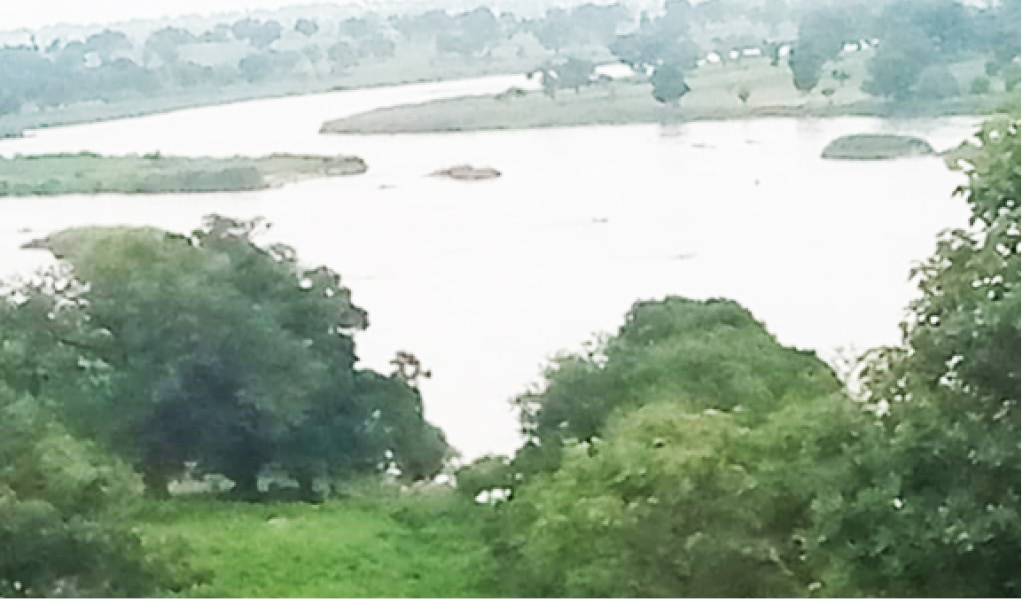The secret history of forgotten German military base in Taraba
In 1910, the German military built a base on a hill in Garbabi, Taraba, northern Nigeria, but clashes with French, English and Belgian forces saw them abandon the base. Our correspondent visits the ruins of the base and writes about the battle that cost the Germans the base. On a hill overlooking River Taraba […]

A view of River Taraba from the former German military base on top of a hill in Garbabi town, Taraba state Photo: Magaji Isa Hunkuyi
In 1910, the German military built a base on a hill in Garbabi, Taraba, northern Nigeria, but clashes with French, English and Belgian forces saw them abandon the base.
Our correspondent visits the ruins of the base and writes about the battle that cost the Germans the base.
On a hill overlooking River Taraba is a town called Garbabi in Gashaka Local Government. On this hill are the ruins of an old German military base built in 1910.
Time and the rains have worn down the building and residents of the nearby town have made off with what they could from the ruins until only two corners of the fort, built of red-burnt bricks, are sticking out of the hill.

Photo: Magaji Isa Hunkuyi
From the top of this hill with a 300-meter elevation, which flattens out at the top in a plateau about the size of a football field on which the base is built, the Germans had a good view of Garbabi town, long before the Bali-Gembu road passed through it and even before it became the headquarters of Garbabi chiefdom.
From the base, one could see the Taraba River snaking through the landscape in both directions for several kilometres. This gave the Germans the chance to monitor movements of small ships and canoes on the river and to detect approaching enemy.
The River Taraba, which has its source on the Mambilla Plateau, some 200 kilometres from the base, drains into the River Benue, just north of Garbabi and it is from the river that the state derived its name.
Garbabi is said to have a small port through which slaves from Northern Cameroon and part of former British-controlled territory, now in Nigeria, and the English and French parts of Cameroon, were transported to coastal areas.
Daily Trust findings revealed that the base was very strategic security-wise to the Germans as it is on the boundary of British-controlled territory of Northern Nigeria.
My guide to the top of the hill, Tanko Hamman Julde Garbabi, who is the current vice-chairman of Gashaka Local Government Council, said he grew up to see some structures of the base standing but with time, these were destroyed.
According to him, there were some rooms that probably served as offices and other small structures within the ruins.
He said in the past, white men, thought to be Germans, used to visit the site regularly. It has been long since they last visited.
The chief of Garbabi, Alhaji Iliyasu Umar, who is in his 60s told Daily Trust in his palace that he grew up to see the base.
“I was informed by the elders in the community that there were military activities in the area but the locals were not involved neither were they allowed into the base, which was referred to as ‘Dutsen Jamus, meaning German hill,” he said.

He said the base was built between 1910 and 1911 and locals, including young women, were forced to take water to the hilltop during the construction of the base by the German military.
The Monarch said that none of those who participated in building the base is alive today, adding that the last person, a woman who was among those that supplied water to the construction team, died two years ago.
He said the base had a stable as patrols at that time were done on horseback by both the German and English troops. The English too had a base in Kundi, now in Bali Local Government Area and it was in that area that a clash between the Germans and the English occurred sometime between 1915 and 1916, resulting in the death of the German captain.
His remains were buried a few kilometres from the base and the site is now known as Kabarin Bature (the white man’s grave).
He said the British also lost a captain during that battle. He too was buried in Kundi.
A coalition of French, British and Belgian troops drove the Germans out of the area causing them to lose their grip on the base and their colony in northern Cameroon, and the area was put in the care of the United Nations as a trust territory. Those territories would be split between the French in Cameroon and the English in Nigeria.
However, in their retreat, the Germans made sure they took everything of value in the base, leaving the fort to the elements.
Before that, the Germans controlled Sardauna, Gashaka, Kurmi in Taraba State and Ganye, Jada, Fufure, Maiha, Mubi, Madagalli and Michika in Adamawa State and some parts of Borno State.
The chief of Garbabi said that it was during the 1961 plebiscite that the areas under the UN trust opted to be part of Nigeria, while other parts opted to be part of Cameroon Republic.
Forsaken, the building fell into ruins and recently, some youths went up the hill and removed many bricks, which is still as strong as when it was made in 1910.
“Much later, the report that some youths had carted away some of the bricks from the building at the base came to me and l have banned members of my community from removing any bricks from the base,” the chief said.
For now, the few bricks left standing on the lonely hill overlooking the River Taraba are the last witnesses to a long-forgotten history.
